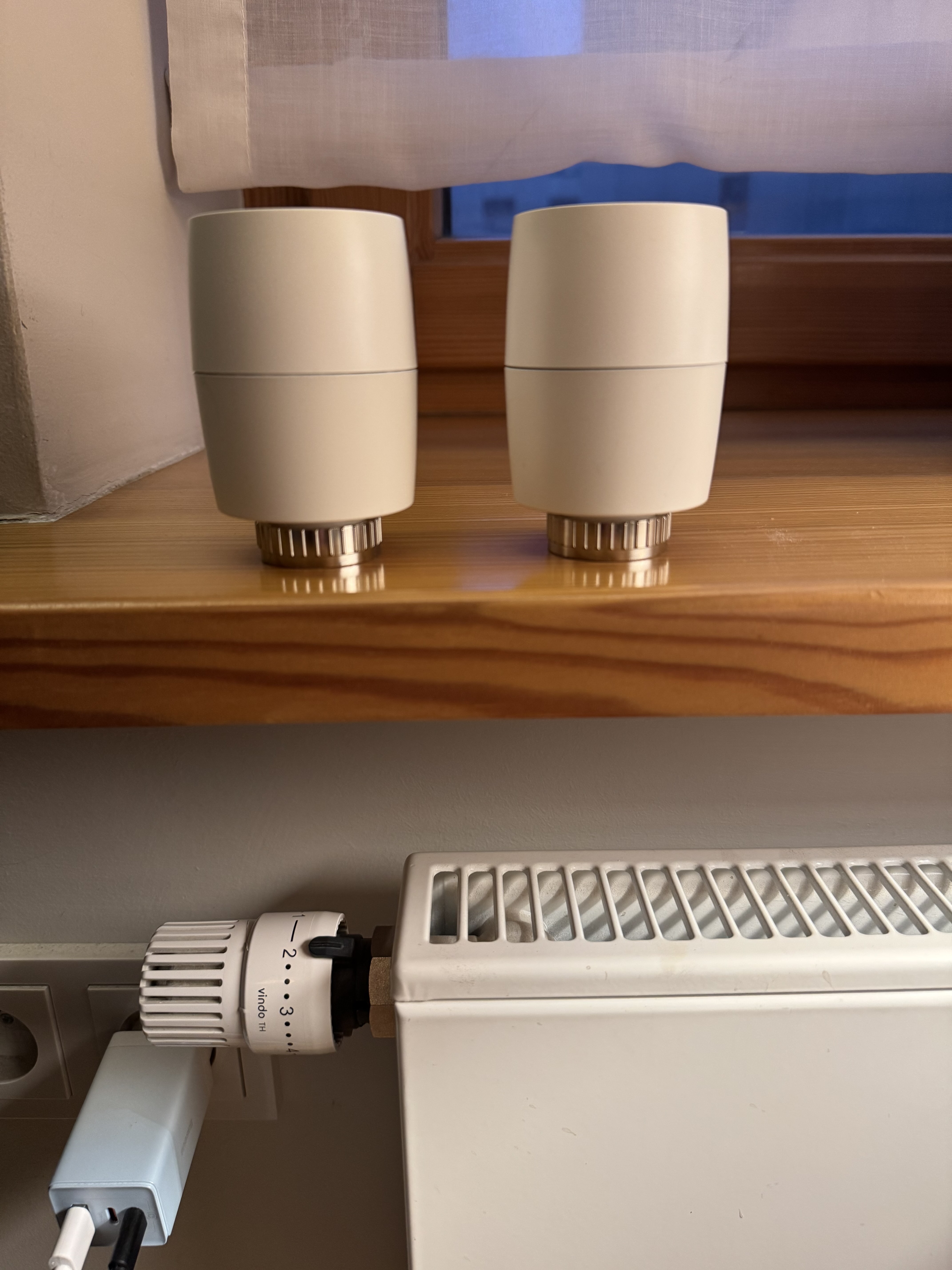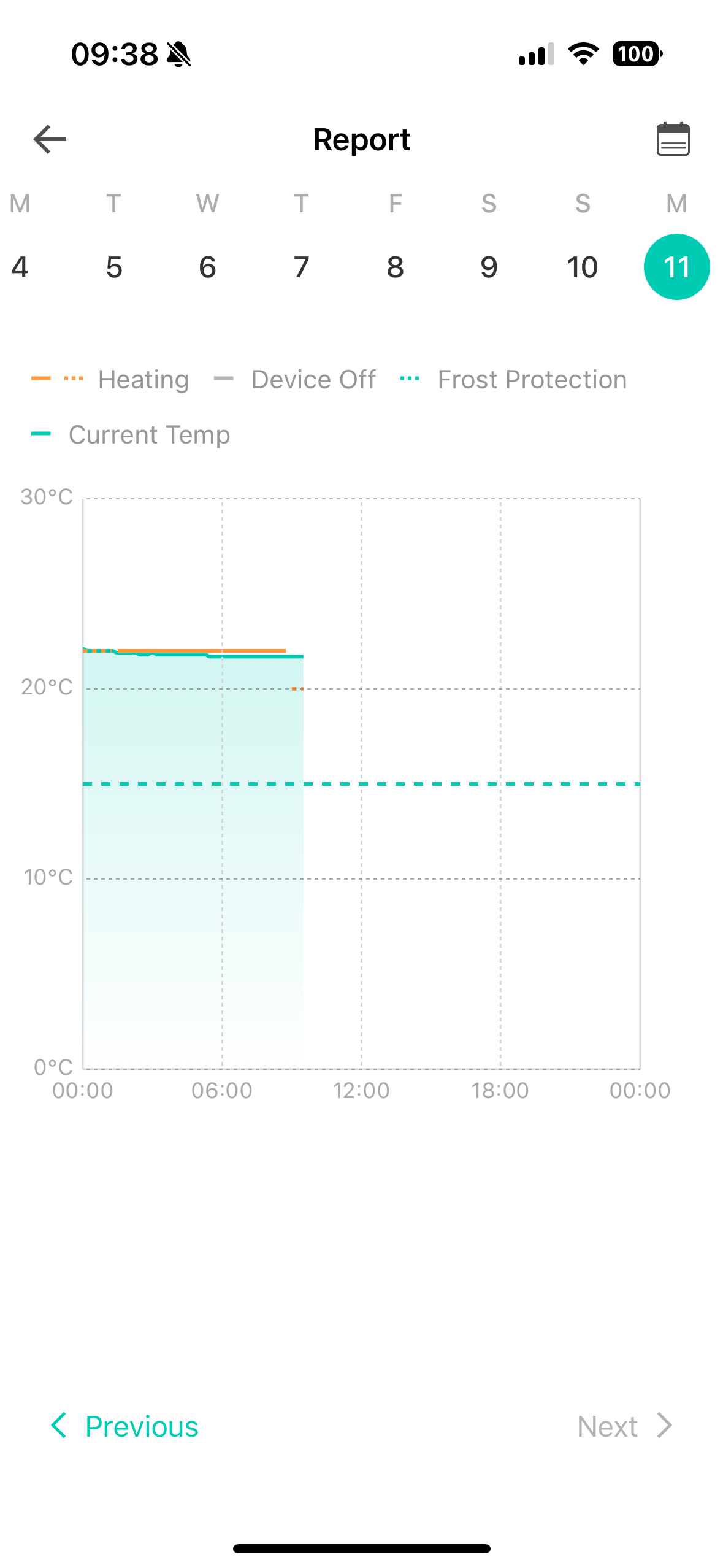Kasa KE100 - unable to maintain temperature, works only as fully open or closed
=====EDIT======
Here is the summary of various issues that KE100 has with maintaining correct temperature:
### Constant cycling between open/closed state, no gradual adjustment/compensation
- Instead of stabilizing the temperature, the TRVs shut down entirely, cool down to "zero," and then heat again.
- This creates thermal discomfort, unwanted temperature cycling, and excessive valve open/close cycles.
- Heaters tend to be stone cold, combined with a temperature 0.5°C below the set point, creating a cold "draft" from windows that is unpleasant. Then, heaters blast hot, which creates the feeling that it’s too hot.
- This occurs for all setups (internal/external temperature sensor).
- In my case, temperature fluctuations (without any change in the environment) range up to 1.0°C.
- The amplitude of this fluctuation pattern likely depends on the room size and heater type (older, "heavier" types would probably result in larger overshoots).
- Discussed in this thread.
Another user complains here:
https://community.tp-link.com/en/smart-home/forum/topic/642914
And another user here:
https://community.tp-link.com/en/smart-home/forum/topic/606280
Also partially here:
https://community.tp-link.com/en/smart-home/forum/topic/699248
- Status: NO SOLUTION
### Constantly below set temperature
- Occurs with both internal and external temperature sensors.
- For some rooms, it’s off by 0.2°C; for others, by 0.5°C.
- Discussed here: https://community.tp-link.com/en/smart-home/forum/topic/699248
- Status: NO SOLUTION
### No feedback on valve state (is it opened/closed...?)
- app does not report if the valve is currently opened or closed, and if open, to what degree (%)
- app shows untrue information on the temperature diagram, always showing "heating" if the temperature is below the set temperature, even though the valve is closed, and the heater is stone cold
- that makes the troubleshooting even more difficult because we do not know what the system is doing or trying to do
- discussed here: https://community.tp-link.com/en/smart-home/forum/topic/714708
===========
I have 9 x KE100 (some paired with T315 external thermometers). Valves use fresh "original" batteries and are directly connected to heaters (no adapters needed). They were also calibrated couple of times. The valves can sucessfully open and close the heater.
These valves struggle to maintain a consistent set temperature. Instead of partially opening to reach a stable state, they open fully, only to shut off completely once the set temperature is reached. This creates a cycle of frequent and abrupt opening and closing. (And no, switching to night mode doesn’t resolve this issue.)
The result is poor thermal comfort: having the room at 23°C with fully open radiators feels vastly different than 22.5°C when the radiators are cold. I don’t want my radiators blazing hot one moment and stone cold 40 minutes later, only to repeat endlessly.
Ideally, these valves should function more like traditional thermostats, gradually adjusting to stabilize at the preset temperature.
It seems that was the intention, as I can quote @Wayne-TP: the valve adjusts its opening ratio according to the set target temperature
(Source: https://community.tp-link.com/en/smart-home/forum/topic/709732?replyId=1437002)
This is simply not accurate. There is either a bug or a flawed implementation in the temperature control system. I haven’t seen any other product in this category behave so irrationally. Right now, I’m considering reverting to my old thermostats (I already did for one room), which, while lacking smart features, were far more reliable. Alternatively, I might switch to a completely different system. It’s unfortunate since I actually like the system overall—both the hardware and the app—but I doubt I’ll get my money back.
Here’s my experience:
- Current temperature at 21°C, set to 23°C: Valves open to 100% and stay fully open until 23°C is reached.
- At 23°C (Current/Set): Valves shut down to 0%, and the radiators start to cool.
- Temperature drops from 23°C to 22.9...22.8...22.7...22.6...22.5: Nothing happens. By this point, all radiators are stone cold.
- Threshold reached: Valves open again to 100%, starting the cycle over. This results in the well-known KE100 “jigsaw” temperature pattern.
The same thing was observed by other users as far back as 2023-11-23 by @MarkData :
https://community.tp-link.com/en/smart-home/forum/topic/642914
Here are some graphs from the app:
The valves "ram" into target temperature at fully opened valves instead of reducing their open state, they shut down and are never able to match the set temp later on.

What happens next - valves shut down completely (contrary top what @Wayne-TP - there is no gradual change)
They become cold (not cooler, COLD) and temperature drops, and drops.... system is not trying to find a good open state, rather it waits until a threshold is hit, probably 0.5C below set temperature. Then it "panics" again and opens all valves.

Another room, and a typical jigsaw with the valves opening and closing constantly over night:

One more important thing: the valve history shows that it was ON all the time (a solid line and orange icon): THIS IS NOT TRUE. Radiators at that time were stone cold!
@Wayne-TP Do you agree with me that this is not correct? Do you need more proof or "convincing" that this is not how thermostatic valves should work?
Will this be fixed in firmware or should I start dismounting my valves? Who will give me my money back - as these valves do not do what they are advertised to do:
Get Ideal Room Temperature with Kasa Smart Thermostatic Radiator Valve KE100
https://community.tp-link.com/en/smart-home/forum/topic/599776
Looking forward for some input - also from other users! And whats more important - looking forward to a firmware update!!





